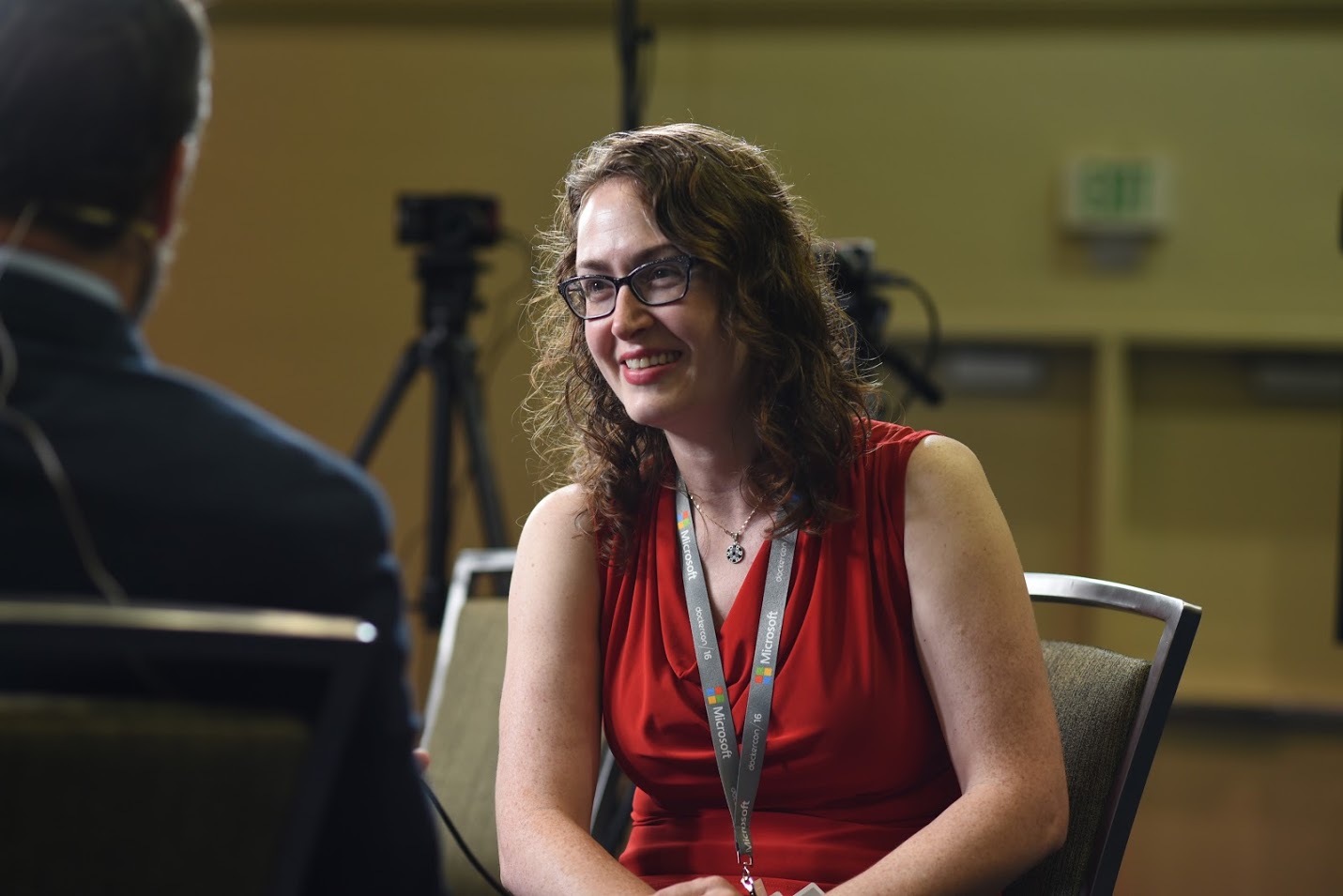 NEWS
NEWS
 NEWS
NEWS
 NEWS
NEWS
Why does the mindset of the developer matter? This week’s featured Woman in Tech provides insight to the challenges and rewards of developer evolution, as we hear from Amy Lewis, director of Field, Channel, and Influence Marketing at SolidFire (a NetApp Company).
NetApp, Inc. completed its acquisition of SolidFire, Inc. this past February for $870 million in cash, staking its claim as the leader in all-flash storage systems market. SolidFire is building the data center of the future using cloud-based models and open-source platforms to create new market growth. Part of the next-gen data center revolves around developers and their new role in infrastructure.
Lewis was interviewed on theCUBE, from the SiliconANGLE Media team, during DockerCon 2016 at the Washington State Convention Center. She spoke with theCUBE cohosts John Furrier (@furrier) and Brian Gracely (@bgracely) about working with developers and the evolution of their role, which has been fueled by customer demand.
As the interview began, Furrier asked Lewis about the magic of using the developer in the commercialization of solutions. She responded by providing insight into the mindset of the developer.
“SolidFire has been interested in this community. We have a focus on developer advocacy. So I think a lot of it is just saying the world is changing. We know that technology is changing. We know the market is evolving and developers are not just people in the basement that nobody talks to anymore. They’ve got storage needs, and they don’t care about infrastructure, true, but they do care about what are their apps going to run on, how is it going to function and how can their life be made easier. I think that there is a natural and evolving synergy.”
She followed up by explaining why developers are misunderstood.
“You know there’s a lot of T-shirts and some pizza, that’s important. In all seriousness, it’s let the code speak for you. It’s a community where your work and your contributions are what speak for you. You can’t put your finger on a particular problem that’s being solved, per se, so I think that is part of what might be frustrating to traditional marketing or traditional sales because it is a process of a thousand pebbles. There isn’t this one big moment where you have a traditional problem, [then] you have one big rollout; it’s constant contribution, constant engagement. It’s what does this API do to solve a very particular problem. If that makes sense, it’s just different.”
When it comes to infrastructure as code, Furrier asked about the timing of where the industry is right now. Lewis explained the new way the enterprise is thinking.
“We are less and less tolerant of being told that things work this way because this is the way it’s always worked. So blame the Millennials, in a good way maybe, but we’ve all become a little bit more Millennial where we want our apps to perform in certain ways. We want things as we want them — when we want them. There’s no going back. That genie doesn’t go back in the bottle. I think we are at the early stage of it. This will become more and more the norm in that classic pioneer town planners/settlers kind of model — we’re going to move to settling very quickly. We have people pioneering in that area, but we’ll see that as the new normal. We will see traditional types of companies entering that space because [they’re] saying there’s a new way of doing business … the industry will move where the customers demand.”
Gracely asked what SolidFire is teaching NetApp about customers. Lewis doesn’t see it as teaching, but instead as a learning experience for both sides.
“There’s a lot of lessons to go both ways. The benefits of an acquisition is everybody gets to learn something. It really is an expansion of a portfolio approach. Part of what’s been interesting is that there’s not as much overlap as one would think, and that’s always a concern when you come in. So you have this portfolio that broadens the spectrum. You sell to different customers within the same large entity, so because we think like a service provider and look to enterprises that have their IT departments function like services providers, we often hit a different customer set within an established customer base, which I think is a really different way of thinking as well. So that’s what we’ve been learning is that there are different people who buy storage for different purposes, back to that infrastructure as code kind of concept.”
Furrier talked to Lewis about DevOps becoming the standard and asked if the operational cycle is becoming more cutting edge? Lewis uses a Darwin-type approach, evolve or die.
“I would agree. I think its evolve or die to be honest, which may sound harsh — it is kind of harsh — but I think people have to evolve their skillsets, they have to know how to do it [grow]. You talk about security for instance, there can be a security breach at any one time, and with automation, with containers, you can be malicious at scale more easily than before, so respect for the people who have to run the operational side, but the demands are extreme. You have to evolve.”
Furrier asked the guest about the vibe of the show. One thing stood out for Lewis.
“One of my passionate issues, I’ve seen more women here then I’ve seen at several conferences I’ve been at in under an hour. So let’s hear it for the women who are doing development. They’re out doing the job, so that’s been very impressive.”
Watch the full interview below, and be sure to check out more of SiliconANGLE and theCUBE’s coverage of the DockerCon 2016.
THANK YOU